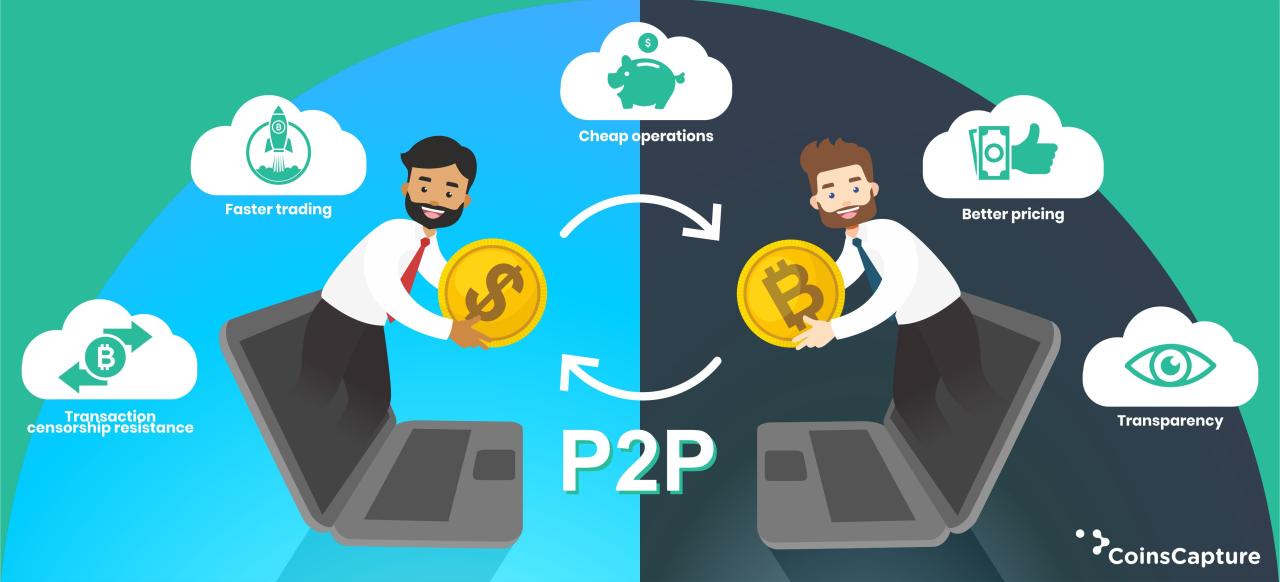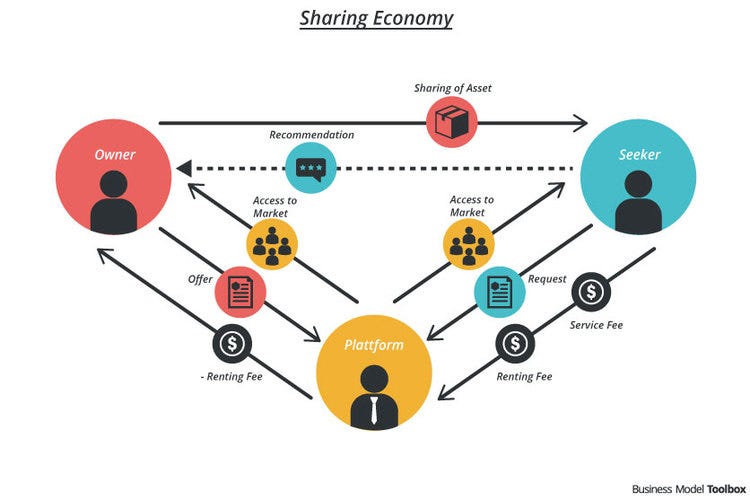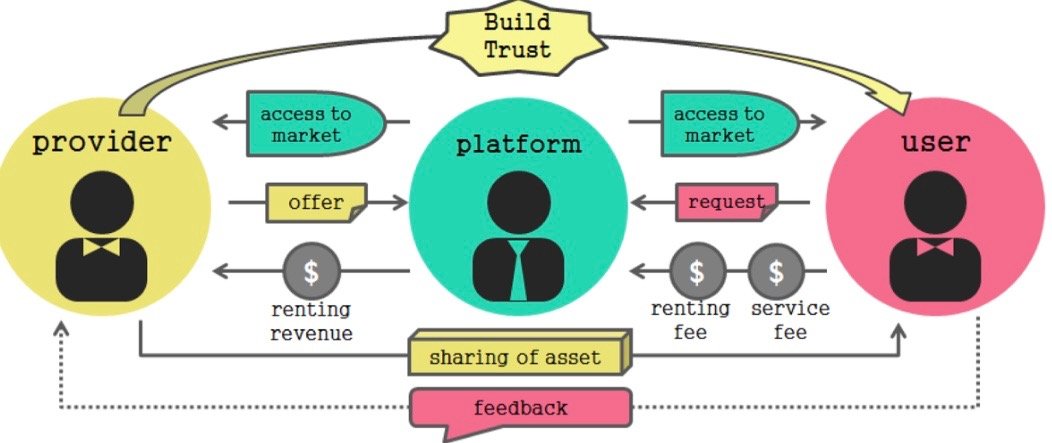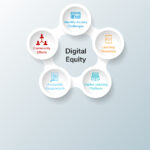Peer-to-peer sharing in the digital economy explained: Unlocking the Potential of Collaborative Consumption

Peer-to-peer sharing in the digital economy explained sets the stage for this enthralling narrative, offering readers a glimpse into a story that is rich in detail and brimming with originality from the outset. As we delve into the world of peer-to-peer sharing, we uncover the transformative impact it has on traditional business models and the way we access goods and services in the digital age.
In this exploration, we will unravel the benefits, challenges, and technological advancements that shape the landscape of peer-to-peer sharing platforms, shedding light on a new era of collaborative consumption that is reshaping the economy.
Introduction to Peer-to-peer Sharing in the Digital Economy

Peer-to-peer sharing in the digital economy refers to the practice of individuals sharing resources directly with one another through online platforms, bypassing traditional business intermediaries. This can include sharing goods, services, or information in a decentralized manner.
How Peer-to-peer Sharing differs from Traditional Business Models
- Peer-to-peer sharing promotes a more collaborative and community-driven approach to accessing resources, as opposed to traditional models based on ownership and profit.
- Traditional business models often involve centralized control and hierarchies, while peer-to-peer sharing platforms empower individuals to directly engage with each other.
- Peer-to-peer sharing can lead to more sustainable resource utilization and reduced waste, compared to traditional models focused on consumption and disposal.
Examples of Popular Peer-to-peer Sharing Platforms
- Airbnb:A platform where individuals can rent out their properties or spare rooms to travelers, enabling peer-to-peer accommodation sharing.
- Uber:A ride-sharing service that connects passengers with drivers in their area, allowing for peer-to-peer transportation.
- TaskRabbit:A platform where users can outsource small jobs and tasks to other individuals in their community, facilitating peer-to-peer service sharing.
Benefits of Peer-to-peer Sharing in the Digital Economy
Peer-to-peer sharing in the digital economy offers various benefits that contribute to sustainability, cost-saving, and enhanced access to goods and services.
Peer-to-peer Sharing Promotes Sustainability
- Reduces waste: By sharing resources and goods with others, individuals can minimize unnecessary production and consumption, leading to a reduction in waste generation.
- Encourages collaboration: Peer-to-peer sharing fosters a sense of community and collaboration among individuals, promoting a more sustainable and environmentally conscious lifestyle.
- Utilizes existing resources efficiently: Instead of each person owning their own set of items, peer-to-peer sharing allows for better utilization of existing resources, reducing the need for excessive production.
Cost-saving Benefits of Participating in Peer-to-peer Sharing Platforms
- Lower expenses: By sharing goods and services with others, individuals can save money on purchasing new items or accessing services at a lower cost compared to traditional methods.
- Shared maintenance costs: Sharing resources often means sharing maintenance costs as well, leading to lower expenses for each participant involved.
- Access to high-quality items at a fraction of the cost: Peer-to-peer sharing platforms provide access to high-quality goods that may be otherwise unaffordable, allowing individuals to enjoy items they might not be able to purchase outright.
Enhanced Access to Goods and Services through Peer-to-peer Sharing
- Increased variety: Peer-to-peer sharing platforms offer a wide range of goods and services, providing users with access to a diverse selection of items they may not have access to otherwise.
- Convenience: Peer-to-peer sharing makes it easier for individuals to access goods and services without the need for ownership, offering a more convenient and flexible way to meet their needs.
- Global reach: With digital platforms facilitating peer-to-peer sharing, individuals can access goods and services from around the world, expanding their options and choices.
Challenges of Peer-to-peer Sharing in the Digital Economy
When it comes to peer-to-peer sharing in the digital economy, there are several challenges that both users and platforms face. These challenges can range from regulatory issues to potential risks associated with using these services.
Regulatory Challenges Facing Peer-to-peer Sharing Platforms
Peer-to-peer sharing platforms often operate in a regulatory grey area, which can lead to legal challenges. Regulations around taxation, licensing, and consumer protection can vary greatly between different regions and countries. This lack of standardized regulations can make it difficult for platforms to ensure compliance and can lead to potential legal issues down the line.
Potential Risks Associated with Using Peer-to-peer Sharing Services
One of the main risks associated with peer-to-peer sharing services is the lack of quality control and oversight. Since these platforms rely on individual users to provide services or products, there is a risk of receiving subpar or unsafe items.
Additionally, there is a potential for fraud or scams to occur, as users may not always be who they claim to be. This lack of accountability can pose a threat to both users and the platform itself.
Impact of Trust and Reputation Systems on Peer-to-peer Sharing
Trust and reputation systems play a crucial role in peer-to-peer sharing platforms. These systems help establish credibility and reliability among users, allowing for a safer and more transparent environment. However, maintaining these systems can be challenging, as users may attempt to manipulate their ratings or reviews.
Ensuring the accuracy and fairness of these systems is essential for building and maintaining trust within the peer-to-peer sharing community.
Technology and Innovation in Peer-to-peer Sharing

Peer-to-peer sharing platforms have seen significant advancements in technology and innovation, revolutionizing the way users interact and transact. Let's delve into how blockchain technology, artificial intelligence, and IoT devices are shaping the landscape of peer-to-peer sharing.
Blockchain Technology in Peer-to-peer Sharing Platforms
Blockchain technology has emerged as a game-changer in peer-to-peer sharing, offering decentralized and secure transactions. By utilizing a distributed ledger system, blockchain ensures transparency and immutability of data, reducing the need for intermediaries. Smart contracts powered by blockchain enable automated agreements between users, enhancing trust and efficiency in peer-to-peer transactions.
Role of Artificial Intelligence in Optimizing Peer-to-peer Sharing Experiences
Artificial intelligence plays a crucial role in optimizing peer-to-peer sharing experiences by providing personalized recommendations, improving user interactions, and enhancing decision-making processes. AI algorithms analyze user behavior and preferences to tailor services, predict demand, and streamline operations. From dynamic pricing to chatbots for customer support, AI enhances the overall user experience in peer-to-peer sharing platforms.
IoT Devices Enhancing Efficiency of Peer-to-peer Sharing Transactions
The Internet of Things (IoT) devices are instrumental in enhancing the efficiency of peer-to-peer sharing transactions by enabling real-time monitoring, tracking, and data collection. IoT devices such as smart locks, sensors, and wearables facilitate seamless access, secure transactions, and remote management of shared resources.
By leveraging IoT technology, peer-to-peer sharing platforms can offer a more convenient and connected experience for users.
Conclusive Thoughts

In conclusion, Peer-to-peer sharing in the digital economy explained illuminates the power of community-driven initiatives and the shift towards a more sustainable and efficient way of consuming goods and services. As we navigate the complexities of peer-to-peer sharing, it becomes evident that this innovative model holds the key to unlocking a future where collaboration and resourcefulness reign supreme.
Popular Questions
What are some popular peer-to-peer sharing platforms?
Examples include Airbnb, Uber, and TaskRabbit.
How does peer-to-peer sharing promote sustainability?
By encouraging the reuse of resources and reducing waste through shared consumption.
What regulatory challenges do peer-to-peer sharing platforms face?
Issues with compliance, taxation, and ensuring user safety.
How does blockchain technology influence peer-to-peer sharing platforms?
It enhances transparency, security, and trust in transactions between users.
What role does artificial intelligence play in optimizing peer-to-peer sharing experiences?
AI can improve matching algorithms, personalized recommendations, and user interactions on platforms.






